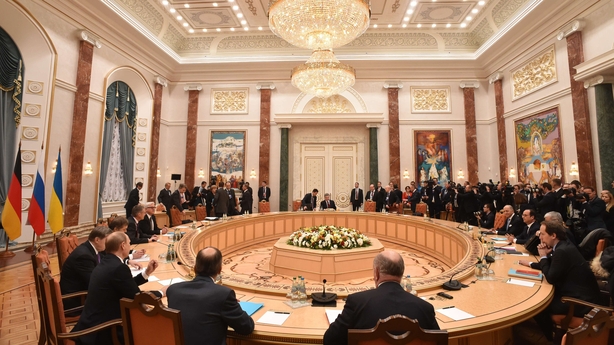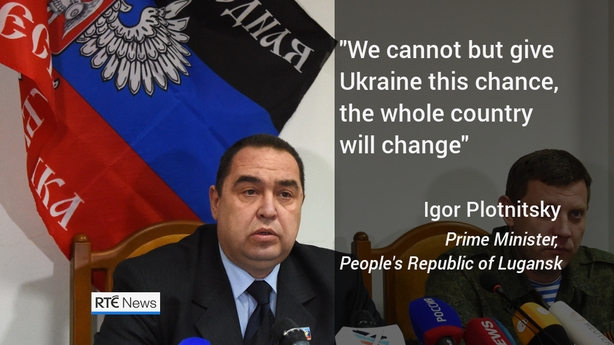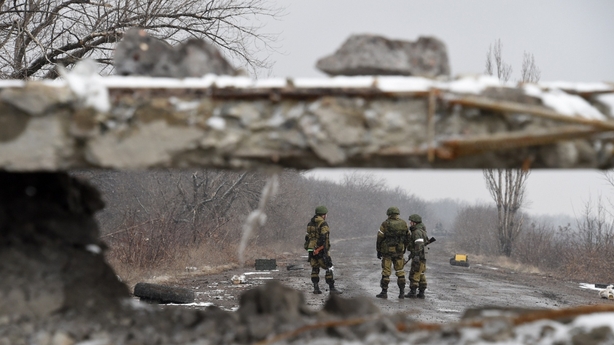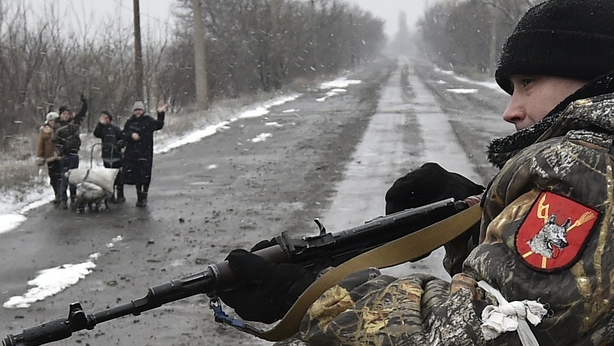The European Union may impose further sanctions if a ceasefire deal sealed in Minsk between Ukraine and Russian-backed rebels is not fully implemented, German Chancellor Angela Merkel and French President Francois Hollande said after an EU summit in Brussels tonight.
Fresh from brokering a deal in Minsk between Russian President Vladimir Putin and Ukrainian President Petro Poroshenko, Ms Merkel told a news conference that EU leaders had asked the European Commission to prepare further sanctions in case the ceasefire did not hold.
"We hold open the possibility, if these new agreements are not implemented, that we must take further measures," she said, adding that existing sanctions could only be lifted when the grounds that led to them are removed.
Mr Hollande echoed Ms Merkel’s words, saying if the Minsk deal is not respected "we would get back into the procedure... where sanctions would be added to the sanctions that are already in place."
The EU has already imposed sanctions on Russia and pro-Russian separatists in Crimea and eastern Ukraine, including visa bans and asset freezes on individuals as well as curbs on access to European capital markets, weapons and technology.
Mr Hollande also said if the ceasefire is fully respected, however, sanctions would progressively be lifted.
Earlier, US Secretary of State John Kerry indicated that sanctions imposed on Russia could be eased if two accords designed to end the conflict in Ukraine are implemented.
In a written statement, Mr Kerry said, "We will judge the commitment of Russia and the separatists by their actions, not their words."
The statement comes after agreement was reached on a ceasefire in eastern Ukraine at overnight talks in Belarus.
Ms Merkel said Russia's Vladimir Putin had put pressure on pro-Russian separatists to agree to the ceasefire, which comes into effect on Sunday.
She said it offered a "glimmer of hope" for an end to the bloodshed.
The deal reached in the Belarussian capital included a ceasefire that would come into effect on 15 February, followed by the withdrawal of heavy weapons.
Ms Merkel said Ukrainian President Petro Poroshenko "did everything to achieve the possibility of an end to the bloodshed".
Mr Poroshenko has said that he expects the process of implementation of the ceasefire will be difficult.

Ukraine also said that 50 tanks had entered the country from Russia during the peace talks.
The news came as Ukraine was offered $40bn by the International Monetary Fund to stave off financial collapse.
"After 17 hours, negotiations in Minsk have finished: ceasefire from Feb. 15 at zero hours, then withdrawal of heavy weapons. Therein lies hope," Ms Merkel's spokesman Steffen Seibert said on Twitter.
"We have managed to agree on the main issues," Mr Putin said.
The deal gives "hope for a peaceful resolution" of the ten-month conflict, pro-Russian separatist leader Alexander Zakharchenko said.
Ukraine town destroyed in rebel offensive
The leaders of Germany, France, Ukraine and Russia had committed to respect Ukraine's sovereignty and territorial integrity, according to a joint declaration distributed by the Kremlin.
"The main thing which has been achieved is that from Saturday into Sunday there should be declared without any conditions at all, a general ceasefire," Mr Poroshenko told journalists.
Ms Merkel and Mr Hollande had joined Mr Poroshenko and Mr Putin for a marathon negotiating session that began early on yesterday evening and continued into this morning.
The summit discussions came as pro-Moscow separatists tightened the pressure on the Ukrainian government by launching some of the war's worst fighting yesterday, killing 19 Ukrainian soldiers in assaults near the railway town of Debaltseve.


As the fighting escalated, the US began openly talking of arming Ukraine to defend itself from "Russian aggression", raising the prospect of a proxy war in the heart of Europe between Cold War foes.
US President Barack Obama said he has yet to make up his mind on the question of sending weapons.
He spoke by phone to Mr Putin on Tuesday, and the White House said he warned the Russian leader that the costs would rise if Russia kept aiding the separatists.
The White House released a statement today welcoming the ceasefire, saying that the move represents a “potentially significant step toward a peaceful resolution of the conflict and the restoration of Ukraine's sovereignty”.
As the French and German leaders’ peace initiative was announced, pro-Russian rebels appeared determined to drive home their advantage ahead of a deal.
Armoured columns of Russian-speaking soldiers with no insignia have been advancing for days around Debaltseve, which has seen heavy fighting in recent days.
On the Russian side of the border, Russia has begun military exercises in 12 regions involving more than 30 missile regiments, RIA news agency reported this morning, citing a Defence Ministry official.

